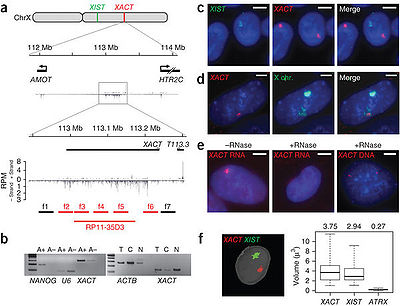Difference between revisions of "XACT"
| Line 1: | Line 1: | ||
==Annotated Information== | ==Annotated Information== | ||
===Approved Symbol=== | ===Approved Symbol=== | ||
| − | XACT | + | XACT X active specific transcript |
| − | |||
| − | X active specific transcript | ||
| − | |||
| − | |||
===Chromosome=== | ===Chromosome=== | ||
Xq23 | Xq23 | ||
| Line 17: | Line 13: | ||
XACT is a 251.8-kb transcription unit(112,983,323–113,235,148 bp) and it locates on chromosome Xq23 between the protein-coding genes AMOT and HTR2C <ref name="ref1" />. | XACT is a 251.8-kb transcription unit(112,983,323–113,235,148 bp) and it locates on chromosome Xq23 between the protein-coding genes AMOT and HTR2C <ref name="ref1" />. | ||
XACT is in an intergenic domain of 1.7 Mb <ref name="ref1" />. | XACT is in an intergenic domain of 1.7 Mb <ref name="ref1" />. | ||
| + | |||
| + | ===Cellular Location=== | ||
| + | XACT is mostly in the nucleus <ref name="ref1" />. | ||
===Function=== | ===Function=== | ||
XACT has a role in the control of human XCI (X-chromosome inactivation) initiation <ref name="ref1" />. | XACT has a role in the control of human XCI (X-chromosome inactivation) initiation <ref name="ref1" />. | ||
[[File:Characterization of XACT, a long intergenic RNA that coats the active X chromosome in hESCs.jpg|right|thumb|400px|'''(a)Localization of XACT and XIST on the human X chromosome (b)RT-PCR analysis (c,d,e)FISH analysis (f) Three-dimensional model of the nuclear volumes occupied by XACT and XIST RNAs.'''<ref name="ref1" />]] | [[File:Characterization of XACT, a long intergenic RNA that coats the active X chromosome in hESCs.jpg|right|thumb|400px|'''(a)Localization of XACT and XIST on the human X chromosome (b)RT-PCR analysis (c,d,e)FISH analysis (f) Three-dimensional model of the nuclear volumes occupied by XACT and XIST RNAs.'''<ref name="ref1" />]] | ||
| − | |||
| − | |||
| − | |||
===Evolution=== | ===Evolution=== | ||
| − | XACT is not conserved in | + | XACT is not conserved in mouse <ref name="ref1" />. |
===Expression=== | ===Expression=== | ||
XACT is expressed in both X chromosomes in humans but not in mice, and the expression of XACT is restricted to pluripotent cells <ref name="ref1" />. | XACT is expressed in both X chromosomes in humans but not in mice, and the expression of XACT is restricted to pluripotent cells <ref name="ref1" />. | ||
| − | === | + | ===Disease=== |
| − | + | chromosome inactivation | |
| + | |||
===Sequence=== | ===Sequence=== | ||
>gi|784642207|ref|NR_131204.1| Homo sapiens X active specific transcript (non-protein coding) (XACT), long non-coding RNA | >gi|784642207|ref|NR_131204.1| Homo sapiens X active specific transcript (non-protein coding) (XACT), long non-coding RNA | ||
| Line 38: | Line 35: | ||
==Labs working on this lncRNA== | ==Labs working on this lncRNA== | ||
| − | * University Paris Diderot, Sorbonne Paris City, Epigenetics and Cell Fate, Paris, France | + | * University Paris Diderot, Sorbonne Paris City, Epigenetics and Cell Fate, Paris, France <ref name="ref1" />. |
==References== | ==References== | ||
Revision as of 15:13, 25 September 2017
Contents
Annotated Information
Approved Symbol
XACT X active specific transcript
Chromosome
Xq23
RefSeq ID
NR_131204
OMIM ID
300901
Ensembl ID
ENSG00000241743
Characteristics
XACT is a 251.8-kb transcription unit(112,983,323–113,235,148 bp) and it locates on chromosome Xq23 between the protein-coding genes AMOT and HTR2C [1]. XACT is in an intergenic domain of 1.7 Mb [1].
Cellular Location
XACT is mostly in the nucleus [1].
Function
XACT has a role in the control of human XCI (X-chromosome inactivation) initiation [1].

(a)Localization of XACT and XIST on the human X chromosome (b)RT-PCR analysis (c,d,e)FISH analysis (f) Three-dimensional model of the nuclear volumes occupied by XACT and XIST RNAs.[1]
Evolution
XACT is not conserved in mouse [1].
Expression
XACT is expressed in both X chromosomes in humans but not in mice, and the expression of XACT is restricted to pluripotent cells [1].
Disease
chromosome inactivation
Sequence
>gi|784642207|ref|NR_131204.1| Homo sapiens X active specific transcript (non-protein coding) (XACT), long non-coding RNA
000001 TTTGTGGATG AGTCAATGAA GAAACTTGTC AAAGCACTTC AATTAAAACA CAGAAACTAT AGAAAATCAT CTGGTAAACA 000080
000081 TGCTGATGAT GTCCTAAACC TGATCACTTG TCTCAAAATT TAGAAAGTTA ATGGCTGAAG ATTCAGCAGC CATTCTGAAC 000160
000161 TGGAAATTAC ATGTTAAGGC TGTTATAGAA GAAATAAAGA AATTAAATCT CTATGTCCCC AAGGTATCTC TATACCGGCC 000240
000241 TGGAATGCCT ATCTCCAAAC CTCCTTTACA TGAGACAGAA ACAGCTTCTA TCACCTTAAA ATCTGTTACT TTAGGTTTTT 000320
000321 TTCATTATGA GCAGCTAAAA TGAATCTTAC TTGATACAGT GTGAGTGTTC ATGGATTAGG GCATTGTTTG ATAAGAGGAG 000400
000401 TAAGAAAAGA ATATAAATTG TATTGGCCCT GATATGCCAC AAACAATGAG GGCTGAAGCC AAATTAATCA AAGAATAAAC 000480
000481 TCAAATACAA AGAACAAAAA AAAAAAAAA
000081 TGCTGATGAT GTCCTAAACC TGATCACTTG TCTCAAAATT TAGAAAGTTA ATGGCTGAAG ATTCAGCAGC CATTCTGAAC 000160
000161 TGGAAATTAC ATGTTAAGGC TGTTATAGAA GAAATAAAGA AATTAAATCT CTATGTCCCC AAGGTATCTC TATACCGGCC 000240
000241 TGGAATGCCT ATCTCCAAAC CTCCTTTACA TGAGACAGAA ACAGCTTCTA TCACCTTAAA ATCTGTTACT TTAGGTTTTT 000320
000321 TTCATTATGA GCAGCTAAAA TGAATCTTAC TTGATACAGT GTGAGTGTTC ATGGATTAGG GCATTGTTTG ATAAGAGGAG 000400
000401 TAAGAAAAGA ATATAAATTG TATTGGCCCT GATATGCCAC AAACAATGAG GGCTGAAGCC AAATTAATCA AAGAATAAAC 000480
000481 TCAAATACAA AGAACAAAAA AAAAAAAAA
Labs working on this lncRNA
- University Paris Diderot, Sorbonne Paris City, Epigenetics and Cell Fate, Paris, France [1].